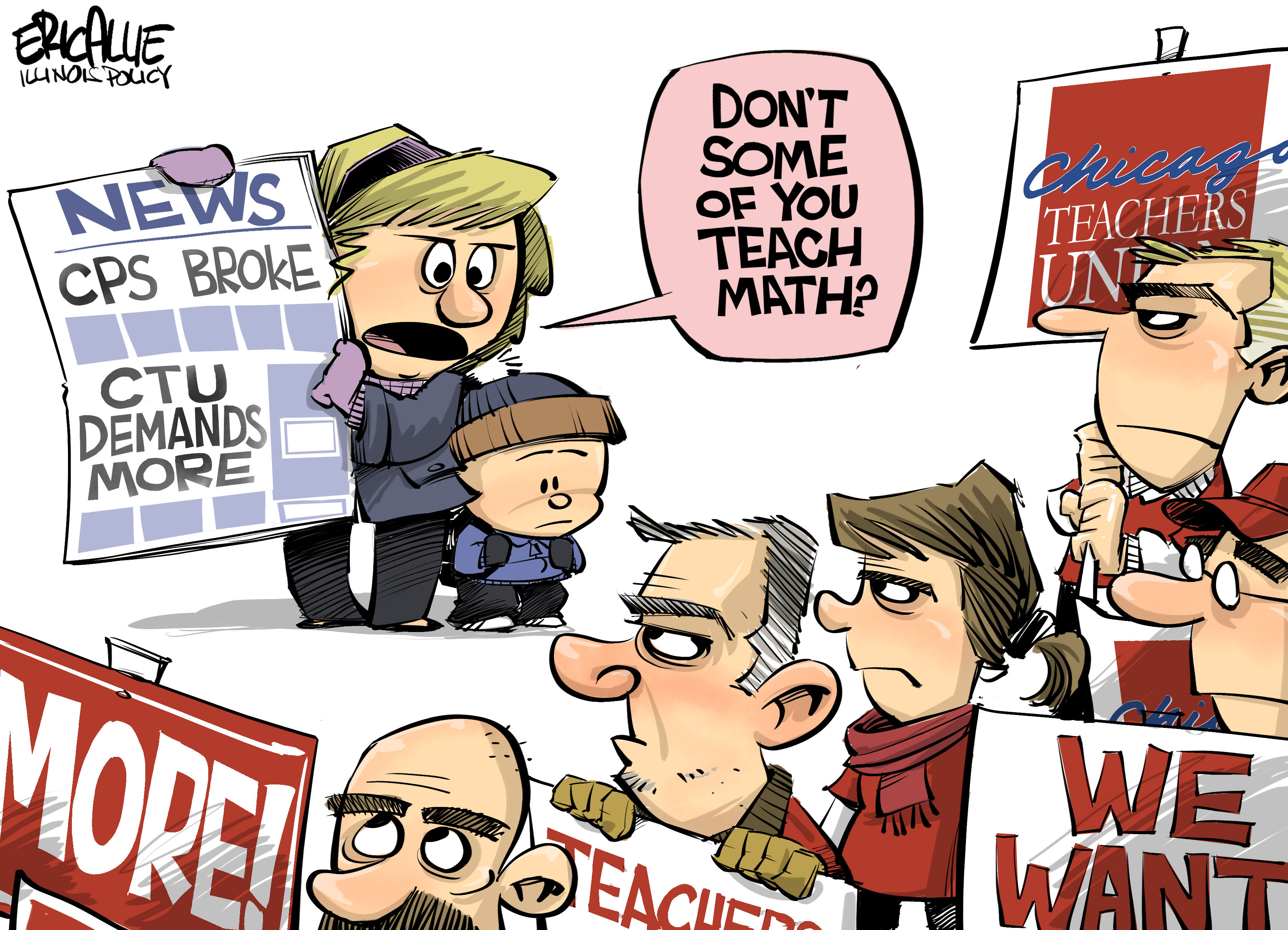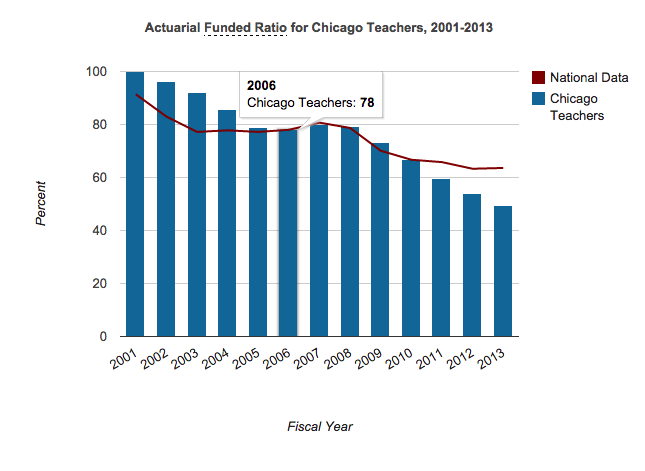More on the Chicago Schools Situation
by meep
The Chicago roundup yesterday sure was fun, wasn’t it?
Let’s do it again!
CHICAGO SCHOOL BONDS TAKE TWO
The bonds are put back on the market, I guess.
Chicago School Deal to Price Wednesday
CHICAGO – Chicago Public Schools said it will price its delayed $875 million bond sale Wednesday, amid heightened acrimony with its teachers union and a renewed state takeover threat.
CPS Chief Executive Officer Forrest Claypool announced the new pricing plan during a news conference to announce $100 million in mid-year spending cuts.
“We’re going back to the bond market tomorrow to raise the necessary resources to restore the financial stability of the district. We have good momentum with investors,” Claypool said Tuesday.
Sure, going back to the market after the teachers union rejected a deal.
Sounds like a winning plan.
WHAT ARE THEY THINKING?
The Chicago Teachers Union, that is.
Let’s check out the reactions to the rejection of the proffered deal and possible strike.
Mark Glennon at WirePoints comments:
In its statement yesterday announcing rejection of the contract offer made by Chicago Public Schools, the Chicago Teachers Union included this:
“ CPS’ uses this math to plug its budget hole:
-$200 million from the state for pensions
-$150 million from the state in a school aid formula change
-$170 million from a new local property tax levy for pensions
-$150 to $175 million from eliminating the teacher’s pension pickup and from increased healthcare costs.”That’s about $700 million. But the offering documents for CPS’s struggling bond offering say its annual structural deficit is $1 billion, and the real number is far worse if you measure pensions properly. And does the CTU really think Springfield will cough up a total bailout of $350 million annually? Never mind what Governor Rauner has said about that, it wouldn’t have a snowball’s chance of getting through the General Assembly. CTU isn’t trying to put up a real plan and many members have to see that.
So, you seriously have to wonder how the minds in the CTU are working. It’s not just greed, though there’s plenty of that. Not just stupidity, though there’s plenty of that, too. Maybe it’s all just negotiation. But my personal sense from watching their rhetoric is that much of its leadership wants to provoke a much broader confrontation — mass strikes, chaos — a people versus The Man uprising. Many of them are classically trained leftists for whom that’s doctrine. And they think they can win. They’ve been drinking the Kool-Aid from the likes of Chuy Garcia, Bernie Sanders and the seminars on Marxism and socialism that many of them attend. Only with that could they achieve the systemic changes they want — soak the rich and corporations, a transactions tax….
An op-ed at the Chicago Sun-Times:
Opinion: Is teachers union on suicide mission?
The Chicago Teachers Union prides itself on being a democratically elected organization that fights for its members. Too bad the members had no say on a very generous contract offer from the Chicago Public Schools that the union leadership summarily rejected.
By all accounts, the deal that Chicago Teacher’s Union President Karen Lewis presented to a 40-member bargaining committee was more than fair to teachers, even if it was less than ideal for parents and students. It avoided teacher layoffs, protected pensions, provided across-the-board raises based on seniority rather than performance and even limited charter school growth.
In exchange, the district would stop paying the so-called “pension pick-up,” under which the districts covers most of the employee pension contribution. Teachers would also pay a little more for health care but the deal is still a net financial gain for teachers.
Yet, the bargaining committee rejected it, denying the rest of the membership a chance to weigh in. Instead, layoffs are now inevitable and the 105-day clock starts ticking, after which the teachers can go on strike.
…..
What is the CTU’s strategy? President Karen Lewis framed this as a “serious” offer, and her team didn’t articulate any substantive objections. Instead, they simply said they just don’t “trust” CPS.
I don’t agree with the bolded. There was a complaint that there was nothing about additional revenue (cough taxes cough) and basically they didn’t trust that the deal would hold financially.
That’s a pretty substantive objection. And given Rauner’s comments, as well as Mark’s above, that seems to be a true objection. The deal is not really workable. The money to pay for it is not there.
It’s possible that the people representing Chicago Public Schools had projections showing that the deal would be sustainable, but the two sides have different assumptions (about such things as the likelihood of the state ponying up).
That said, it’s not like you can negotiate higher taxes in a contract negotiation. So…. what’s their BATNA? Because I don’t think they’re going to be able to negotiate something much better than this.

CREDIT: Eric Allie at Illinois Policy Institute
I’VE GOT YOUR BATNA RIGHT HERE: STATE TAKEOVER
Oh look, the state could take over the school system:
Gov. Bruce Rauner on Tuesday said he’s preparing for a state takeover of Chicago Public Schools and has told state Board of Education members to start looking for an interim superintendent for the city’s cash strapped school district.
At a news conference in Springfield to discuss legislation that would change the state’s procurement process, Rauner said he’s already told the state Board of Education to begin the process of identifying who can take over as superintendent of CPS.
“The state’s going to be ready to step in and take action,” Rauner said a day after the Chicago Teachers Union rejected a contract proposal from CPS.
Gov. Bruce Rauner said Tuesday he’s directed his State Board of Education to begin a financial review of Chicago Public Schools and start a search for a new superintendent, even though legislation he wants to authorize a state takeover is dead on arrival in the Democrat-controlled legislature.
It might not be DOA if the Chicago teachers strike. And everybody realizes they’re not willing to deal.
Interestingly, the governor seems to agree with the union, the proposed contract was unsustainable:
“The mayor proposed an unaffordable contract, it was unaffordable, it was more kicking the can and getting by and he was pushing off the day of reckoning and the teachers union still rejected that,” Rauner said.
Despite the political realities of a Democrat-run legislature unwilling to turn over control of the state’s largest school system to a first-term Republican governor, Rauner said he is not deterred. He directed the state education board to prepare for a possible takeover anyway, with his office sending a memo asking education officials to identify someone who could serve as interim superintendent.
And even if the legislature balks now, if Rauner has a plan in place, then he’s got a pretty good BATNA going.
Here’s an earlier article on the idea:
Republican state legislators in Illinois on Wednesday [January 20] proposed that the state take over Chicago Public Schools and allow the severely indebted district to declare bankruptcy in order to get its finances in order.
…..
The proposed legislation would allow the state to create an independent authority to run Chicago’s public schools, instead of the Chicago Board of Education, until the district sorts out its troubled finances.Another proposed measure would allow Chicago’s school district to declare bankruptcy, which could release it from pension obligations and void its union contracts.
…..
The editors pointed to a report by accounting and consulting firm Ernst & Young that projected annual deficits of $1 billion for Chicago’s school system going forward, culminating in 2020 with an accumulated deficit of $5.4 billion. That’s almost the district’s annual operating budget, the editors pointed out.If the state takeover proposal passes, this will not be the first time Chicago’s schools fall under state control.
The district faced severe financial problems and regular teacher strikes back in the 1980s. In 1987, explains WBEZ, then-US Secretary of Education William Bennett called Chicago schools “the worst” in the nation. Banks at that point had refused to lend the district money.
So the state took emergency control of the district for 15 years, from 1980 to 1995, and then returned the responsibility back to the mayor, who at the time was Mr. Daley.
Yeah, I would be careful about saying that the state won’t take over the schools.
BLAST FROM THE PAST: THE PENSION PIT AND UNDERCONTRIBUTIONS
So someone did talk about what happened when Daley got his mitts on the Chicago schools:
When state lawmakers gave Mayor Richard M. Daley control of Chicago Public Schools in 1995, the deal included sweeping changes to the laws that controlled how the district spent its money. The biggest revenue shift came from combining several property tax levies—including one earmarked to pay for teacher pensions—into one fund that could be used to pay current operating expenses. That year, $62.2 million was diverted from pension payments to operating expenses. CPS also contributed $24 million to the teachers pension fund that year.
This was not the first time CPS had used pension funds for the regular budget. Between 1990 and 1993, Springfield transferred dedicated pension revenue to district operations in order to pay for teacher raises and bonuses. (The Chicago Teachers Union backed the move.) But for the two years prior to mayoral control of Chicago’s schools, the district had only been permitted to borrow from the fund, not divert payments.
I hate needing to tell people, but contributions to pensions are current operational expenses.
That they’re not treated that way, being thought of as some future expense and we’re just being nice to put in some money right now…that’s how they get into trouble.
Let me break out the graphs — the contribution history:

Years of not making full contributions led to this:

CREDIT: Public Plans Database
Yes, that money was siphoned off for other stuff, some of which was higher salaries for teachers.
This is a bit old, and is overwhelmed by the recent (then) bad investment experience, but you can see from the table at the bottom that undercontributions are a large component of the unfunded liability.
I got some more recent data, which I have graphed below:

That “other” bar includes changes in the actuarial valuation assumptions, but there’s a lot of unexplained stuff in that “other” as well from the original sources. That vertical scale is in dollars. And yes, the hole for the Chicago Public Teachers pensions is about $10 billion. And it just keeps getting bigger every year that full payments are not being made.
So yes, the CTU had a point that one can’t really “trust” the deal, because it doesn’t actually fix anything.
Related Posts
Kentucky Pension Liabilities: Trends in ERS, County, and Teachers Plans
Public Pension Watch: California and Illinois Executive Resignations, Spiking v. California Rule, and more!
Pennsylvania Pensions: Liability Trends
